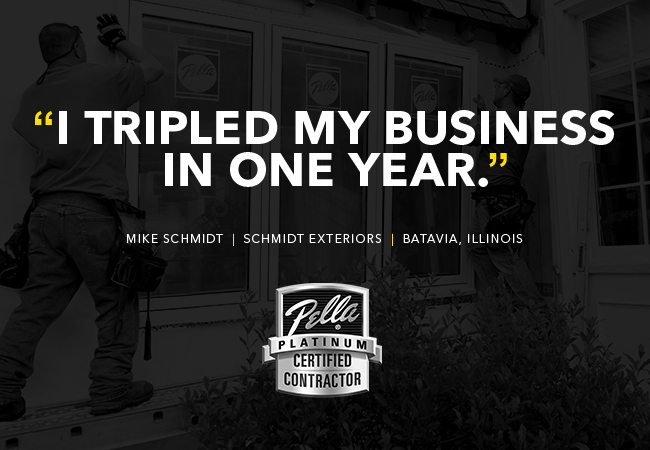How a Platinum Pella Certified Contractor Tripled His Business in One Year
Chicago-area contractor Schmidt Exteriors finds success in a competitive environment.

For Mike Schmidt of Schmidt Exteriors in Batavia, Illinois, the Platinum Pella Certified Contractor® program isn’t just a perk. It’s a driving force behind his business.
“There’s a lot of competition out there now. It’s more important than ever for contractors to take a sophisticated approach to lead generation and marketing,” Schmidt said. “The Platinum Pella Certified Contractor program helps me tremendously.”
Though he now finds the program’s benefits indispensable, Schmidt wasn’t always sold. However, it didn’t take long for him to see results and change his mind.
‘When Pella approached me to join the program, I was reluctant,” Schmidt admitted. “But when I finally joined, I tripled my business in one year.”
Since his game-changing decision to join the program, Schmidt has actively taken advantage of the exclusive benefits and tools that come with it.
“There’s a prestige associated with the program, and I use it to market my business,” Schmidt explained. “Plus, there’s unprecedented education and training for installation, marketing and how to conduct yourself professionally – everything you need to build a solid team.”
One of Schmidt’s favorite Platinum sales tools is GreenSky® customer financing.
“I can have a $50,000 deal approved, signed and documented in less than 10 minutes,” he said. “And customers don’t have to tap into a home mortgage line or deal with appraisals and paperwork.”
Though Pella’s sales and marketing tools have played a major role in growing his business, the personal, long-term relationship with his Pella rep is what Schmidt values most.
“I’ve worked with Josh for more than 15 years now, and our working relationship is a huge benefit to my business,” he reminisced. “We could sit and talk forever about everything other than windows, but he’s always ready to step up to the plate and get work done.”
Schmidt’s relationship with his Pella support team has influenced him to take a personal approach with his own customers. In fact, he believes that approach has been a key factor in his success.
“My Pella reps taught me early on to treat my clients like people,” he said. “I don’t talk about windows at all during the first 15 minutes of a consultation. I want to know how many kids they have, how long they plan to live in the house and what their goals are so I can guide them to the right decision.
I know my clients are making big decisions with big dollars. And I need to understand them before throwing out a sales pitch.”
Schmidt believes that delivering on his clients’ goals sometimes means steering them away from more lucrative projects. But he knows that giving honest advice has helped him build a solid reputation.
“They may say they want one product, but another might line up better with their goals and budget,” Schmidt explained. “If I give them what they need to make a smart and educated decision, they’ll feel confident in the work I do.”
Schmidt has learned that a contractor’s ability to adapt and change is the key to continuing success. And the resources he gets with the Pella Contractor program are huge assets when it comes to staying at the forefront of a changing marketplace.
“Contractors in the program are much more likely to succeed because they’re given the product knowledge, marketing skills, salesmanship and customer leads to be at that top level. The benefits continue to unfold. “
* source “Pella Professional” http://professional.pella.com/resource-center/pella-certified-contractor-tripled-business




